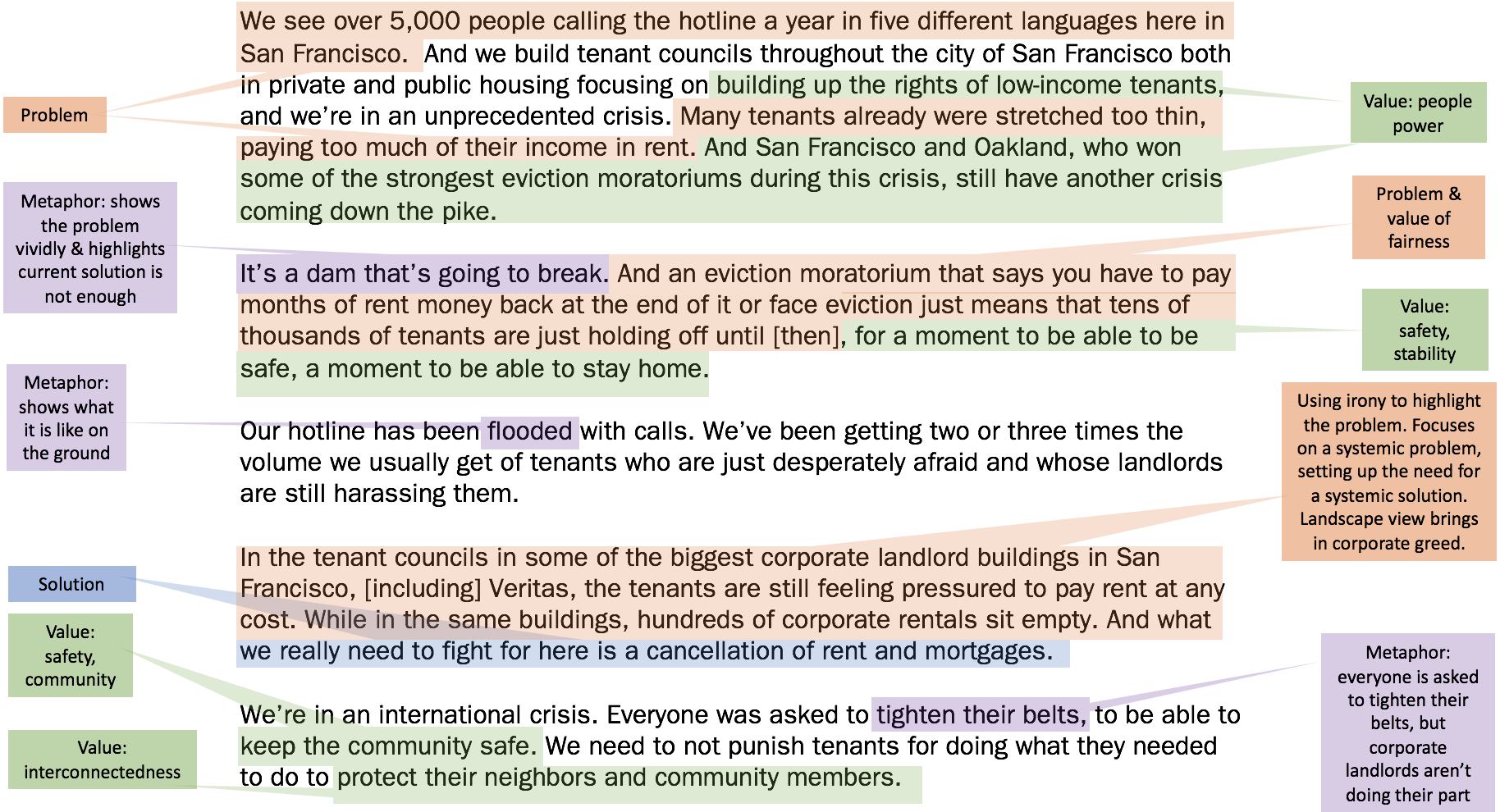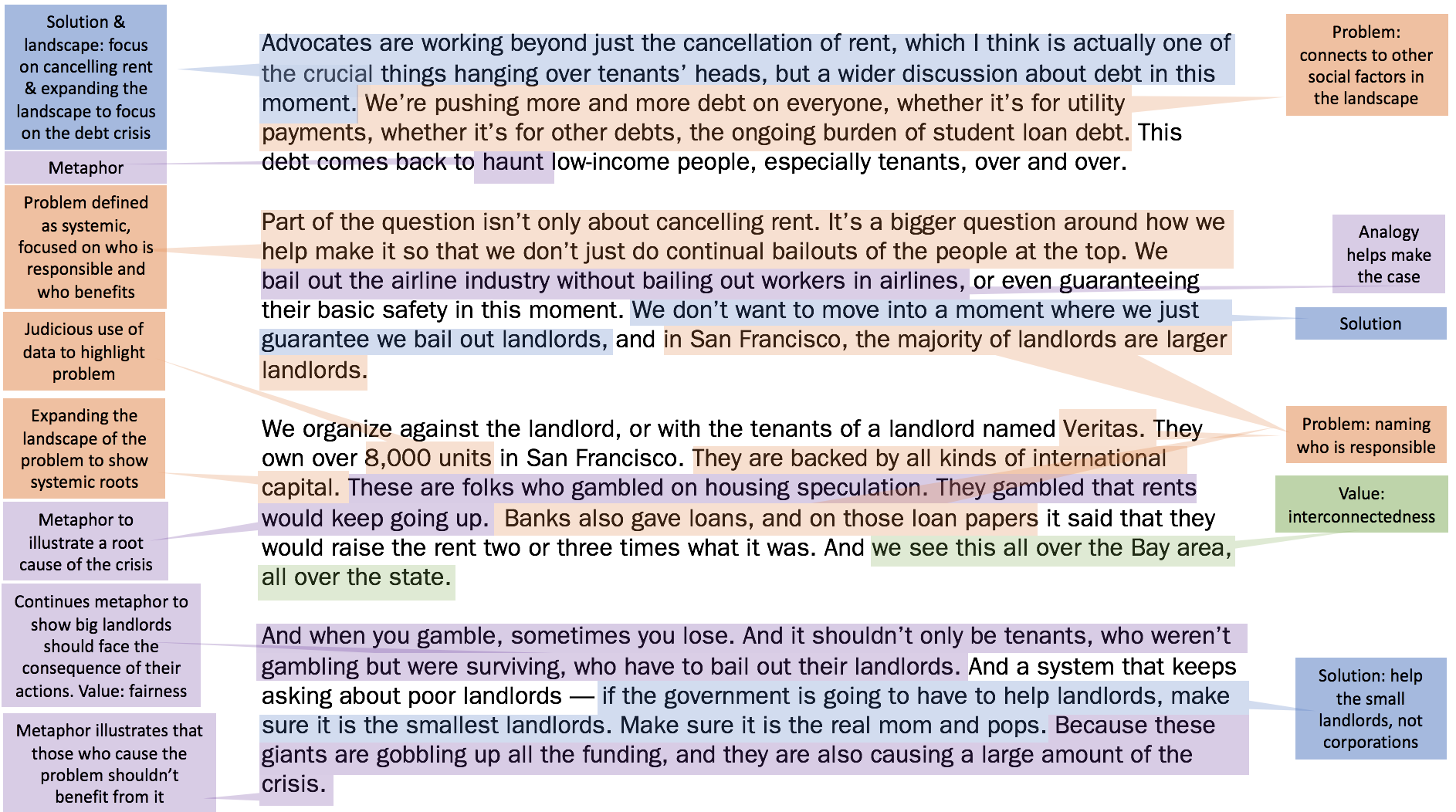Communicating about housing and COVID-19: Tips for responding to reporters
by: Katherine Schaff and Shaddai Martinez Cuestas
posted on Monday, July 06, 2020
Housing policy is always complex, and even more so during COVID-19, which adds another layer of challenge to communicating about it. BMSG recently created a guide to help advocates craft effective messages that show how housing is a public health and health equity issue, using several examples of recently published op-eds. But advocates aren’t always in full control of the message. What happens when, instead of proactively writing your own opinion piece, you must respond to questions from a reporter?
The good news is that with some nimbleness and practice, you can still shape the narrative around housing and health, and you can touch on all three components of an effective message: the problem, solution, and values. This came across when BMSG joined the Bay Area Regional Health Inequities Initiative, Council of Community Housing Organizations, and Public Advocates in May 2020 to host a reporter roundtable to help reporters connect to a broad range of sources who can illustrate the link between these issues.
During the event, “Bay Area Community Stories on Housing, Health, and COVID-19,” advocates prepared brief opening remarks — they were given just two minutes — and then had to respond on the spot to reporters’ questions. Sarah “Fred” Sherburn Zimmer, the executive director of the Housing Rights Committee of San Francisco, gave a terrific response to a reporter’s question that encapsulated many communication recommendations for framing the debate and shifting the narrative, including:
- naming who is responsible and who benefits from the problem;
- describing systemic solutions, not just individual problems;
- keeping a strong focus on values;
- incorporating the landscape view so the context is visible (and not just the portrait);
- using powerful metaphors and simple language to make it easier to understand the context, problem, and solutions; and
- showing people power by reframing tenants as effective organizers demanding change, rather than victims of hard situations.
As an example of how to more confidently and effectively discuss housing and health with journalists, we’ve posted Fred’s introductory comments below, as well as her response to a reporter’s question. At the end of the blog, we’ve included the same comments but with each message component highlighted.
Fred’s brief introductory remarks
We see over 5,000 people calling the hotline a year in five different languages here in San Francisco. And we build tenant councils throughout the city of San Francisco both in private and public housing focusing on building up the rights of low-income tenants, and we’re in an unprecedented crisis. Many tenants already were stretched too thin, paying too much of their income in rent. And San Francisco and Oakland, who won some of the strongest eviction moratoriums during this crisis, still have another crisis coming down the pike.
It’s a dam that’s going to break. And an eviction moratorium that says you have to pay months of rent money back at the end of it or face eviction just means that tens of thousands of tenants are just holding off until [then], for a moment to be able to be safe, a moment to be able to stay home.
Our hotline has been flooded with calls. We’ve been getting two or three times the volume we usually get of tenants who are just desperately afraid and whose landlords are still harassing them.
In the tenant councils in some of the biggest corporate landlord buildings in San Francisco, [including] Veritas, the tenants are still feeling pressured to pay rent at any cost. While in the same buildings, hundreds of corporate rentals sit empty. And what we really need to fight for here is a cancellation of rent and mortgages.
We’re in an international crisis. Everyone was asked to tighten their belts, to be able to keep the community safe. We need to not punish tenants for doing what they needed to do to protect their neighbors and community members.
Reporter’s question: What are advocates working toward next?
Advocates are working beyond just the cancellation of rent, which I think is actually one of the crucial things hanging over tenants’ heads, but a wider discussion about debt in this moment. We’re pushing more and more debt on everyone, whether it’s for utility payments, whether it’s for other debts, the ongoing burden of student loan debt. This debt comes back to haunt low-income people, especially tenants, over and over.
Part of the question isn’t only about cancelling rent. It’s a bigger question around how we help make it so that we don’t just do continual bailouts of the people at the top. We bail out the airline industry without bailing out workers in airlines, or even guaranteeing their basic safety in this moment. We don’t want to move into a moment where we just guarantee we bail out landlords, and in San Francisco, the majority of landlords are larger landlords.
We organize against the landlord, or with the tenants of a landlord named Veritas. They own over 8,000 units in San Francisco. They are backed by all kinds of international capital. These are folks who gambled on housing speculation. They gambled that rents would keep going up. Banks also gave loans, and on those loan papers it said that they would raise the rent two or three times what it was. And we see this all over the Bay area, all over the state.
And when you gamble, sometimes you lose. And it shouldn’t only be tenants, who weren’t gambling but were surviving, who have to bail out their landlords. And a system that keeps asking about poor landlords — if the government is going to have to help landlords, make sure it is the smallest landlords. Make sure it is the real mom and pops. Because these giants are gobbling up all the funding and they are also causing a large amount of the crisis.
Fred’s introductory remarks (same as above but with message components highlighted)

Reporter’s question: What are advocates working toward next?

Thank you to Fred Zimmer for being a strong advocate for housing justice and allowing us to share her remarks. And thank you to all the participants in the reporters’ roundtable — advocates and journalists — for helping policymakers and the public understand the stakes in local decisions about housing.
Have a story to share about a time when a housing-related interview with a reporter when particularly well? Or not so well? We’d love to hear about your successes and roadblocks. Connect with us at info@bmsg.org, on Twitter @BMSG, or on Facebook.



